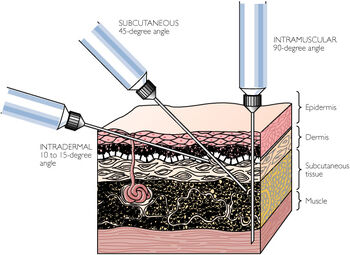No edit summary |
|||
| Line 1: | Line 1: | ||
| − | [[Image:F0329-01.jpg|thumb|right|350px|Examples of subcutaneous and intramuscular injections.]]Intramuscular insulin injection is a technique used for both pets and people in an effort to hasten [[onset]], compared to the usual technique of injecting [[subcutaneously]]<ref>{{cite web|url=http://cgibin.rcn.com/johncm/cgi-bin/index.pl?Site=Insulin#2|title=Questions About Insulin|publisher= Diabetes-World Mailing List}}</ref>. It's often referred to medically by the abbreviation IM.<ref>{{cite web|url=http://www.insulinjournal.com/pdfs/v3_i1_05_37_heinemann_1-30.pdf|title=Variability of Insulin Action:Does It Matter?-page 40 (4 of 9)|author=Heinemann, Lutz|date=January 2008|publisher=Insulin Journal}}</ref> |
+ | [[Image:F0329-01.jpg|thumb|right|350px|Examples of subcutaneous and intramuscular injections.]]Intramuscular insulin injection is a technique used for both pets and people in an effort to hasten [[onset]], compared to the usual technique of injecting [[subcutaneously]] <ref>{{cite web|url=http://cgibin.rcn.com/johncm/cgi-bin/index.pl?Site=Insulin#2|title=Questions About Insulin|publisher= Diabetes-World Mailing List}}</ref>. It's often referred to medically by the abbreviation IM. <ref>{{cite web|url=http://www.insulinjournal.com/pdfs/v3_i1_05_37_heinemann_1-30.pdf|title=Variability of Insulin Action:Does It Matter?-page 40 (4 of 9)|author=Heinemann, Lutz|date=January 2008|publisher=Insulin Journal}}</ref> |
| − | Because [[absorption]] of [[Subcutaneously|subcutaneous]] insulin can be altered by [[dehydration]] (mainly slower than normal), intramuscular insulin injections can be used for cases involving dehydration and/or [[ketoacidosis]]<ref>{{cite web|url=http://www.vin.com/proceedings/Proceedings.plx?CID=WSAVA2009&Category=8060&PID=53521&O=Generic |title=New Strategies in the Management of Canine Diabetes Mellitus|author=Herrtage, Michael|year=2009|publisher=WSAVA}}</ref>. |
+ | Because [[absorption]] of [[Subcutaneously|subcutaneous]] insulin can be altered by [[dehydration]] (mainly slower than normal), intramuscular insulin injections can be used for cases involving dehydration and/or [[ketoacidosis]] <ref>{{cite web|url=http://www.vin.com/proceedings/Proceedings.plx?CID=WSAVA2009&Category=8060&PID=53521&O=Generic |title=New Strategies in the Management of Canine Diabetes Mellitus|author=Herrtage, Michael|year=2009|publisher=WSAVA}}</ref>. |
{| |
{| |
||
| Line 9: | Line 9: | ||
|style="padding:5px;border:2px solid #ffb6c1;background-color:#ffe4e1;" width="50%"| |
|style="padding:5px;border:2px solid #ffb6c1;background-color:#ffe4e1;" width="50%"| |
||
| − | Because it carries with it a substantial risk of [[hypoglycemia]]<ref>{{cite web|url=http://www.ncbi.nlm.nih.gov/entrez/query.fcgi?itool=abstractplus&db=pubmed&cmd=Retrieve&dopt=abstractplus&list_uids=2146067 |title=Different Absorption of Isophane (NPH) Insulin From Subcutaneous and Intramuscular Sites|author=Thow JC, Johnson AB, Fulcher G, Home PD.|year=1990|publisher=Diabetic Medicine}}</ref><ref>{{cite web|url=http://web.archive.org/web/20070706222317/http://patients.uptodate.com/topic.asp?file=diabete/2942 |title=Insulin Treatment-Needle and Syringe|publisher=Patients Up To Date}}</ref> , giving insulin intramuscularly should only be done with guidance from a medical professional. Insulins which are not [[soluble]] are able to be used intramuscularly, unlike [[intravenously]], which requires soluble insulins only. |
+ | Because it carries with it a substantial risk of [[hypoglycemia]] <ref>{{cite web|url=http://www.ncbi.nlm.nih.gov/entrez/query.fcgi?itool=abstractplus&db=pubmed&cmd=Retrieve&dopt=abstractplus&list_uids=2146067 |title=Different Absorption of Isophane (NPH) Insulin From Subcutaneous and Intramuscular Sites|author=Thow JC, Johnson AB, Fulcher G, Home PD.|year=1990|publisher=Diabetic Medicine}}</ref><ref>{{cite web|url=http://web.archive.org/web/20070706222317/http://patients.uptodate.com/topic.asp?file=diabete/2942 |title=Insulin Treatment-Needle and Syringe|publisher=Patients Up To Date}}</ref> , giving insulin intramuscularly should only be done with guidance from a medical professional. Insulins which are not [[soluble]] are able to be used intramuscularly, unlike [[intravenously]], which requires soluble insulins only. |
|} |
|} |
||
Revision as of 01:27, 5 October 2010

Examples of subcutaneous and intramuscular injections.
Intramuscular insulin injection is a technique used for both pets and people in an effort to hasten onset, compared to the usual technique of injecting subcutaneously [1]. It's often referred to medically by the abbreviation IM. [2]
Because absorption of subcutaneous insulin can be altered by dehydration (mainly slower than normal), intramuscular insulin injections can be used for cases involving dehydration and/or ketoacidosis [3].
|
Because it carries with it a substantial risk of hypoglycemia [4][5] , giving insulin intramuscularly should only be done with guidance from a medical professional. Insulins which are not soluble are able to be used intramuscularly, unlike intravenously, which requires soluble insulins only. | ||
References
- ↑ Questions About Insulin. Diabetes-World Mailing List.
- ↑ Heinemann, Lutz (January 2008). Variability of Insulin Action:Does It Matter?-page 40 (4 of 9). Insulin Journal.
- ↑ Herrtage, Michael (2009). New Strategies in the Management of Canine Diabetes Mellitus. WSAVA.
- ↑ Thow JC, Johnson AB, Fulcher G, Home PD. (1990). Different Absorption of Isophane (NPH) Insulin From Subcutaneous and Intramuscular Sites. Diabetic Medicine.
- ↑ Insulin Treatment-Needle and Syringe. Patients Up To Date.
More Information
- Variation in Absorption of NPH Insulin Due to Intramuscular Injection Diabetes Care-1990